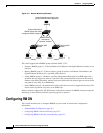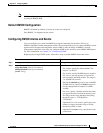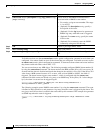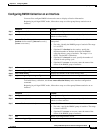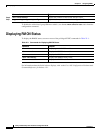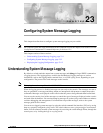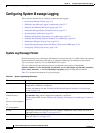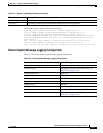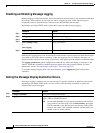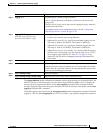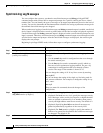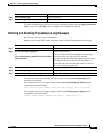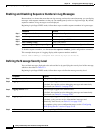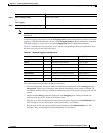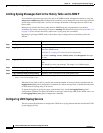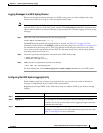
23-4
Catalyst 2950 Desktop Switch Software Configuration Guide
78-14982-01
Chapter 23 Configuring System Message Logging
Configuring System Message Logging
Disabling and Enabling Message Logging
Message logging is enabled by default. It must be enabled to send messages to any destination other than
the console. When enabled, log messages are sent to a logging process, which logs messages to
designated locations asynchronously to the processes that generated the messages.
Beginning in privileged EXEC mode, follow these steps to disable message logging:
Disabling the logging process can slow down the switch because a process must wait until the messages
are written to the console before continuing. When the logging process is disabled, messages are
displayed on the console as soon as they are produced, often appearing in the middle of command output.
The logging synchronous global configuration command also affects the display of messages to the
console. When this command is enabled, messages appear only after you press Return. For more
information, see the “Synchronizing Log Messages” section on page 23-6.
To re-enable message logging after it has been disabled, use the logging on global configuration
command.
Setting the Message Display Destination Device
If message logging is enabled, you can send messages to specific locations in addition to the console.
Beginning in privileged EXEC mode, use one or more of the following commands to specify the
locations that receive messages:
Command Purpose
Step 1
configure terminal Enter global configuration mode.
Step 2
no logging on Disable message logging.
Step 3
end Return to privileged EXEC mode.
Step 4
show running-config
or
show logging
Verify your entries.
Step 5
copy running-config startup-config (Optional) Save your entries in the configuration file.
Command Purpose
Step 1
configure terminal Enter global configuration mode.
Step 2
logging buffered [size] Log messages to an internal buffer. The default buffer size is 4096. The
range is 4096 to 4294967295 bytes.
Note Do not make the buffer size too large because the switch could run
out of memory for other tasks. Use the show memory privileged
EXEC command to view the free processor memory on the switch;
however, this value is the maximum available, and the buffer size
should not be set to this amount.



